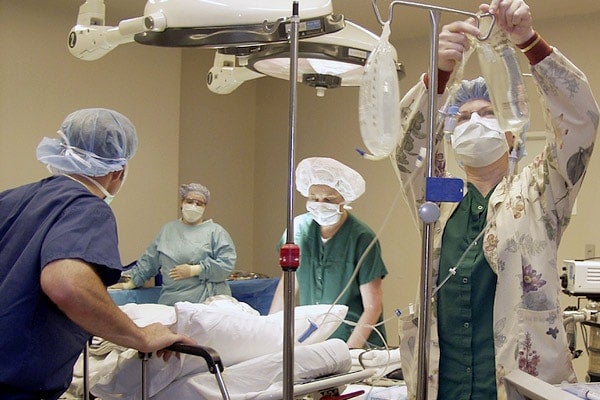
U of T professors perform Ontario's first cardiac stem cell transplant
Published: January 27, 2012
University of Toronto faculty members performed the first cardiac stem cell transplant in Ontario recently, using stem cells derived from the patient's own bone marrow, isolated completely within the operating room, and implanted into the heart at the time of coronary bypass surgery.
Since heart failure is a leading cause of death in Canada, the researchers hope that stem cell therapy may be developed into a novel treatment for the 50,000 Canadians diagnosed each year with advanced heart failure. The first patient to receive this type of stem cell therapy, James Culross, a 67-year-old man from Etobicoke, will be discharged this week from Toronto General Hospital after 2.83 million stem cells were injected into seven sites where his heart had been damaged by a heart attack in November.
The stem cells were injected following coronary artery bypass graft (CABG) surgery, by a multi-disciplinary team led by Dr. Terrence Yau, a U of T professor of surgery and director of the Cardiac Stem Cell Therapy Program at the hospital’s Peter Munk Cardiac Centre, part of the University Health Network (UHN).
Traditional treatments for heart attacks save many lives and prevented further heart attacks, but they cannot reverse the effect of heart attacks that have already occurred. While researchers hope that stem cell therapy will improve the function of hearts injured by heart attacks, the safety and efficacy of stem cell therapy must first be clearly demonstrated in clinical trials such as the IMPACT-CABG Trial, a trial now underway in Toronto and Montreal.
"When a patient suffers a heart attack, part of the heart muscle dies and is replaced by scar. The larger the heart attack, the more likely that patient is to develop heart failure, in which the heart becomes progressively weaker. Patients develop shortness of breath, initially during activity but later at rest as heart failure progresses, and ultimately die of this disease," said Yau, who holds the Angelo & Lorenza DeGasperis Chair in Cardiovascular Surgery Research.
Using a novel process, unique in Canada, in which stem cells are isolated by means of a rigorously-tested process in the UHN’s organ regeneration laboratory, located entirely within operating room suite, researchers removed, prepared and injected the stem cells back into the patient on the same day.
"Manipulating the cells in-house preserves cell viability. Injecting the stem cells into the heart as soon as possible after they are isolated from the patient's bone marrow may improve their ability to improve heart function," said Dr. Richard Weisel, a U of T professor of surgery and senior scientist at UHN’s McEwen Centre for Regenerative Medicine.
Here's how the process works: 100 millilitres of bone marrow is acquired the morning of the patient's bypass surgery from the iliac crest – the flat portion of the hip bone located near the lower back – which is rich in bone marrow. The bone marrow is then brought to the organ regeneration laboratory, where research technicians use a clinical-grade magnetic separating device called the CliniMACS to separate the appropriate stem cells from other components of the bone marrow. During the stem cell isolation procedure, which takes four to six hours, the patient rests until surgery, which is scheduled for early afternoon.
The end result is two millilitres of clear fluid containing several million stem cells that have been rigorously tested to ensure that they pass Health Canada-approved release criteria. The cells are brought in a sterile tube to the operating room where Yau's coronary artery bypass graft (CABG) surgery is underway. After the bypass grafts have been completed, Yau fills a syringe with the stem cells and injects them into the area of the heart that has been damaged by a heart attack.
To date, more than 500 heart patients worldwide have been treated with a variety of stem cell preparations. Eight patients have been treated at the Maisonneuve-Rosemont Hospital in Montreal as part of the IMPACT-CABG Clinical Trial. Toronto and Montreal researchers will merge their results after each centre performs stem cell transplants in 20 patients. The objective of the IMPACT-CABG Trial is to demonstrate the safety of injecting stem cells into the hearts of patients undergoing CABG surgery, and to gather information on the feasibility and efficacy of this approach.



